Table of Contents
Daily Current Affairs for Government Exams:
Today Current Affairs: 20th January 2020 for UPSC IAS exams, State PSC exams, SSC CGL, State SSC, RRB, Railways, Banking Exam & IBPS, etc.
Contents:
- Irrawaddy Dolphins in the Chilika Lake.
- The ballistic missile, K-4
- A Steppe Eagle.
- Northern white rhino.
- Sexual harassment in the workplace.
- Report highlighting the impact of trade shutdown between India and Pakistan.
- Hyperloop project
- The National Informatics Centre (NIC):
- other important current affairs.
1. Irrawaddy Dolphins in the Chilika Lake:
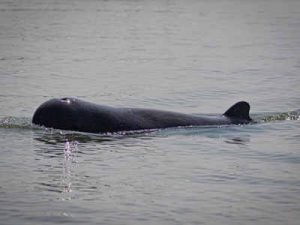
Odisha Forest Department officials sighted 146 endangered Irrawaddy dolphins in Chilika Lake, which boasts of the highest single lagoon population of the aquatic mammal in the world.
About:
- Scientific name: Orcaella brevirostris.
- These dolphins have a bulging forehead, SHORT BEAK, and 12-19 teeth on each side of both jaws.
- They pop out their head out of the water to breathe, followed by its back; the tail is rarely seen.
- Regions where they are found: Coastal areas in South and Southeast Asia, and in three rivers namely The Irrawaddy (Myanmar), the Mahakam (Indonesian Borneo) and the Mekong.
- The total population of these animals in the world is estimated to be less than 7,500. Of these, the highest — 6,400 — was reported from Bangladesh.
- The population in Chilika is considered to be the highest single lagoonal population.
- Dolphins had been under stress in Chilika due to unregulated boating by tourists as well as illegal prawn enclosures.
- IUCN Status: Endangered.
2. The ballistic missile, K-4.:

The Defence Research and Development Organisation (DRDO) successfully test-fired a 3,500-km range submarine-launched ballistic missile, K-4.
- K-4 is one of the two underwater missiles that were being developed by DRDO. The other one is the over 700-kilometer strike range BO-5 missile.
- The missile has been tested several times earlier as part of developmental trials to validate different parameters.
- Once inducted, these missiles will be the mainstay of the Arihant class of indigenous ballistic missile nuclear submarines and will give India the stand-off capability to launch nuclear weapons submerged in Indian waters.
- INS Arihant, the first and only operational SSBN, is armed with K-15 Sagarika missiles with a range of 750 km.
3. Rare Steppe Eagle Spotted in Andhra Pradesh:
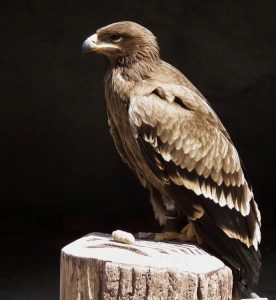
A Steppe Eagle (Aquila nipalensis) has been sighted in Andhra Pradesh during Asian Bird Census. This is the second time a Steppe Eagle has been sighted in Andhra Pradesh in the past two decades.
- The sighting of this rare species highlights the need for exploration of the diversity of avian life in the State.
Steppe Eagle
- The Steppe Eagle is a migratory raptor that has undergone an extremely rapid population declines within all its range.
- Steppe Eagles may make migratory movements of many thousands of kilometers crossing numerous national jurisdictional boundaries.
- The bird has moved from ‘Least Concern’ to ‘Endangered’ under IUCN Red List.
4. Northern white rhino:
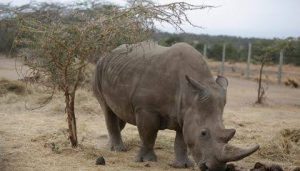
Researchers have created another embryo — the third — of the nearly extinct northern white rhino, a remarkable success in an ongoing global mission to keep the species from going extinct.
- The death of Sudan in 2018, who was earlier at the Dvur Králové Zoo in the Czech Republic, left the world with only two northern white rhinos, Najin, 30, and Fatu, 19 — both female.
- The northern white is one of the two subspecies of the white (or square-lipped) rhinoceros, which once roamed several African countries south of the Sahara.
- According to IUCN, the subspecies is considered Critically Endangered (Possibly Extinct in the Wild).
- The other subspecies, the southern white is, by contrast, the most numerous subspecies of rhino, and is found primarily in South Africa. There is also the black (or hook-lipped) rhinoceros in Africa, which too, is fighting for survival, and at least three of whose subspecies are already extinct.
5. Sexual harassment at the workplace:
The Group of Ministers (GoM) headed by Home Minister Amit Shah, which was constituted to strengthen the legal framework to prevent sexual harassment at the workplace, has finalized its recommendations.
- The GoM was constituted first in October 2018 in the aftermath of the #MeToo movement after many women shared their ordeal on social media.
Present scenario:
- The Women and Child Development Ministry had steered the Sexual Harassment of Women and Workplace (Prevention, Prohibition and Redressal) Act in 2013, which was applicable to government offices, the private sector, NGOs and the unorganized sector.
Need for stricter provisions:
- The 2013 Act has entrusted the powers of a civil court to the Internal Complaints Committee (ICC)without specifying if the members need to have a legal background.
- This was a major lacuna given that the ICC formed an important grievance redressal mechanism under the framework of the act.
- The 2013 act only imposed a fine of ₹50,000 on employers for non-compliance with respect to the constitution of the ICC.
- This proved to be insufficient in ensuring that the employers constituted the ICC in a time-bound manner.
Overview of Vishakha guidelines:
- The proposed amendments would be largely based on the Vishaka Guidelines laid down by the Supreme Court in 1997, on which the 2013 Act was based.
- It made the employer responsible to prevent or deter acts of sexual harassment at the workplace.
6. Report highlighting the impact of trade shutdown between India and Pakistan:
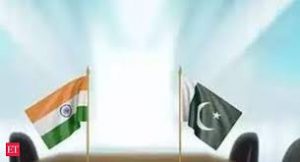
The Bureau of Research on Industry and Economic Fundamentals (BRIEF) has released a report highlighting the impact of trade shutdown between India and Pakistan on people across borders.
- The report is called “Unilateral Decisions, Bilateral Losses”.
- Following the Pulwama attacks, trade between India and Pakistan across the Wagah-Attari border and the Line of Control (LoC) Salamabad-Chakhan da Bagh routes were closed in 2019.
- MFN (most favored nation) status to Pakistan was also canceled.
- Pakistan has also imposed few countermeasures, including an airspace ban and suspension of trade relations.
Impacts of these decisions:
- The decisions on trade were meant to be a tough message for Pakistan and would impact Pakistan’s economy even more than India’s. Even though ties have been much worse in the past like after the Parliament attack, trade had never been touched.
- Now, at least 9,354 families, roughly 50,000 people, in Punjab and about 900 families in Kashmir have been directly impacted.
- Both countries have lost billions of dollars and hundreds of job days.
- These measures that led to a 200% duty increase on imports from Pakistan at Punjab saw even the relatively meager bilateral trade of $2.56 billion in 2018-2019 dropping to $547.22 million (April-August 2019) – imports dropping from about $500 million to just $11.45 million.
- Similarly, the closure of LoC trading points in Jammu and Kashmir has put small trade, handicrafts sellers, truckers, labourers, and hotel owners near the LoC in Baramulla and Poonch out of business.
- the center now has to take up this matter seriously and give equal attention to the development of livelihoods of those affected. Besides, national security should not be compromised.
- The governments should also consider compensating them for the losses and finding alternative trading markets internally so that those affected are not put out of business permanently.
What is the Most Favoured Nation status?
- A treatment accorded to a trade partner to ensure non-discriminatory trade between two countries vis-a-vis other trade partners.
- It is the first clause in the General Agreement on Tariffs and Trade (GATT). Under WTO rules, a member country cannot discriminate between its trade partners. If a special status is granted to a trade partner, it must be extended to all members of the WTO.
7. Hyperloop project:

The proposed Pune-Mumbai Hyperloop project, an ultra-modern transport system that will reduce the traveling time between the two cities to 25 minutes from 2.5-3 hours, maybe scrapped by the state government.
- The state has expressed reservations about the project that was still in its experimental stage, and had not been “implemented anywhere in the world”.
What is the hyperloop transportation system?
- It is a transportation system where a pod-like vehicle is propelled through a near-vacuum tube connecting cities at speeds matching that of an aircraft.
- The hyperloop concept is a brainchild of Tesla founder Elon Musk.
- In hyperloop transportation, custom-designed capsules or pods are expected to zip smoothly through continuous steel tubes which are held at a partial vacuum.
- The pod which sandwiches the passenger compartment between an air compressor upfront and a battery compartment in the rear is supported by air caster skis at the bottom.
- The skis float on a thin layer of air provided under high pressure, eliminating rolling resistance and allowing for movement of the pods at high speeds.
- These capsules are expected to be driverless with estimated speeds of 1,000 km/h. Linear induction motors that are placed along the tube control the speed of the pod. Electronically-assisted acceleration and braking determine the speed of the capsule.
8. The National Informatics Centre (NIC):
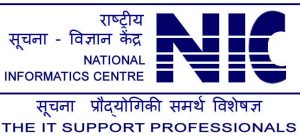
The National Informatics Centre (NIC) is to hold a 2-day technology Conclave in New Delhi. The event is to be conducted between January 21, 2020, and January 22, 2020. The Conclave is to be inaugurated by Union Minister Shri Ravi Shankar Prasad.
- The Technology Conclave will discuss the application of Information and Communication Technology. The conclave is to be held under the theme
- Theme: Technologies for NextGen Governance
- The Conclave will predominantly contribute towards building efficient Government officers in the country. It will also help to deliver high-quality services that primarily focus on citizens.
- The Conclave will focus on hyper-scale, cybersecurity, design thinking and architecture.
- NIC plays a major role in adopting new technologies within the administration of government.
- Recently, NIC launched a Centre for BlockChain Technology in Bengaluru.
Other important current affairs:
1. The Union health ministry launched this year’s Pulse Polio Programme.
- Polio or poliomyelitis is a highly infectious viral disease, which mainly affects young children.
- The virus is transmitted by person-to-person, spread mainly through the fecal-oral route or, less frequently, by a common vehicle (e.g. contaminated water or food) and multiplies in the intestine, from where it can invade the nervous system and can cause paralysis.
2. The Government of India, the Government of Assam and the World Bank signed a loan agreement of $88 million for the implementation of the Assam Inland Water Transport Project.
- Under the Assam Inland Water Transport Project (AIWTP), the infrastructure of passenger ferry services will be improved and the capacity of institutions running the inland water transport will be strengthened.
- The project will support the Government of Assam’s efforts to corporatize its own ferry activities.
3. Union Minister for Road Transport & Highways presented the ‘National Highways Excellence Awards’ to outstanding performers in National Highways (NH) sector.
- National Highways Excellence Awards’ were instituted in the year 2018. Following the success of the first cycle of awards in 2018, the Ministry decided to make the National Highways Excellence Awards an annual feature.
- The aim is to recognize companies that are performing exceptionally well in the construction, operations, maintenance and tolling stages of highway development as well as in the arena of road safety.
- The seven award categories are:
- Excellence in Project Management,
- Excellence in Operation and Maintenance,
- Excellence in Toll Management,
- Excellence in Highway Safety,
- Innovation,
- Outstanding Work in Challenging Conditions, and
- Green Highway.
4. The government is planning for the nationwide rollout of Pneumococcal Conjugate Vaccine (PCV) under the Universal Immunisation Programme (UIP).
- According to government estimates, a countrywide rollout of PCV would require about 50% of the budget of UIP (minus shared costs such as staff salary, establishment costs, etc).
- PCV is the costliest vaccine in the UIP basket that currently covers only about 50% of the 26 million birth cohort in Himachal Pradesh, Madhya Pradesh, Haryana, Bihar, Uttar Pradesh, and Rajasthan.
- The cost challenge for India’s immunization program is set to mount further as Global Alliance for Vaccines and Immunizations (GAVI) is set to withdraw its support for India from 2022.
- GAVI is an international organization that brings together public and private sectors to create equal access to vaccines for children.
5. Public procurement platform ‘Government e-Marketplace (GeM)’ has launched a national outreach program called GeM Samvaad to attract sellers to sell products online to government buyers.
- The government is trying to reach out to stakeholders across the country and also local sellers in order to facilitate the on-boarding of local sellers on the marketplace while catering to specific requirements and procurement needs of buyers.
- GeM is a one-stop National Public Procurement Portal to facilitate online procurement of common use Goods & Services required by various Central and State Government Departments / Organizations /Public Sector Undertakings ( PSUs).
- It was launched in 2016 to bring transparency and efficiency in the government buying process.
- It operates under the Ministry of Commerce and Industry.
- The procurement of goods and services by Ministries and the Central Public Sector Enterprises (CPSEs) is mandatory for goods and services available on GeM.
6. The APEDA (Agricultural and Processed Food Products Development Authority) has added 135 laboratories to the existing 51 laboratories.
- With this initiative, the total number of agricultural product testing laboratories in the country has increased to 186.
7. The Delhi Government released the guarantee card that consisted of 10 guarantees for the residents of Delhi. It included free bus services, electricity, water supply, pollution, etc.
- Electricity: The card guaranteed uninterrupted power supply throughout the year. It also included free electricity for all the residents up to 200 units of consumption.
- Water: The card also assured supply of 24/7 clean drinking water to every household of the Territory by 2025.
- Infrastructure: The Guarantee card included free education, better health facility and mohalla clinics for those living in unauthorized colonies.
8. The United Nations had set the target of reducing carbon emissions from the shipping industry by 50% by 2050 as compared to the levels in 2008.
9. Indian National Security Advisor (NSA) Ajit Doval met Sri Lankan President Gotbaya Rajapaksa.
- He discussed setting up of maritime research coordination center in the country.
- The establishment of the research center is important to learn maritime activities in the Indian Ocean Region.
10. The 9th edition of Kolkata International Children’s Film Festival has begun in Kolkata, West Bengal.
- The festival will showcase 255 films from 35 countries.
- National award-winning ‘Hamid’ was the inaugural film.
- The National award winner child actor, Talha Arsad Rishi inaugurated the festival.
11. Former principal secretary to PM, Nripendra Misra has been appointed as chairman of the executive council of the Nehru Memorial Museum and Library (NMML).
12. Union minister Arjun Munda was elected as president of the suspended Archery Association of India (AAI).
- A three-time Jharkhand chief minister, he is also the president of Jharkhand Archery Association
- He defeated Assam Archery Association president BVP Rao.
13. The Ministry of Jal Shakti released a report on efficiency targets in the review of state and Central government water departments.
- As per the report, Gujarat has topped in the list
- Rajasthan is the third-best and Delhi is among the worst-performing states.
- Among the seven Central departs reviewed, the Survey of India has got the top billing followed by the National Institute of Hydrology and Central Water Commission.
14. The 50th World Economic Forum (WEF) at Davos, Switzerland begins today and continues till 24th.
- Union Minister for Commerce and Industry, Piyush Goyal will be leading the Indian delegation.
- Goyal will also participate in an informal WTO Ministerial gathering being held in Davos during this period.
- He will also meet the DG of WTO and Secretary-General of Organisation for Economic Co-operation and Development (OECD).




